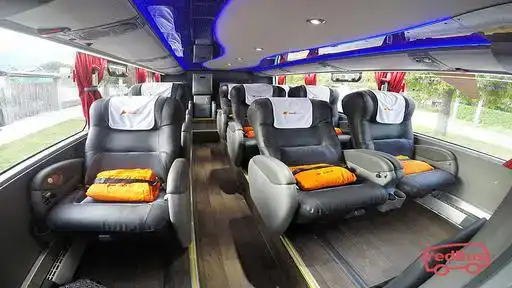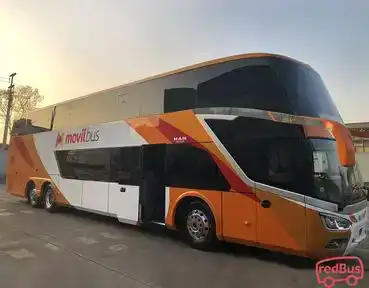Chachapoyas to Trujillo Bus
OUR PROMISE
SECURE PAYMENT
redBus has secure payments and keeps your information and purchases completely safe and secure.
ATTRACTIVE DEALS
Get amazing discounts every time you book with redBus
WIDE CHOICE OF BUSES
150+ Bus companies with 800+ Routes in Perú
Chachapoyas to Trujillo Bus Service
Avg. Bus Duration
:12 hrs 30 mins
Buses depart from
:Chachapoyas
Bus arrives in
:Trujillo
Cheapest Bus
:PEN 90.00
Bus Companies
:1
Earliest Bus
:19:04
Last Bus
:19:04
Daily Bus Services
:1
Buy Chachapoyas to Trujillo Bus Tickets Online - Unlock Extra Savings with redDeals on redBus
Travel by Bus from Chachapoyas to Trujillo
The road journey from Chachapoyas to Trujillo is pleasant and relaxing. At redBus, we work with different bus companies that operate on this route with well-maintained buses and experienced drivers. Although the travel time varies from one bus operator to another because of traffic and climatic conditions, our continuous availability of bus services between Chachapoyas and Trujillo reduces uncertainty and offers convenience for travelers.
Top Bus Operator Images





OTHER BOARDING & DROPPING POINTS IN
Chachapoyas
- Terminal Chachapoyas
Trujillo
- Trujillo
Why book a Chachapoyas to Trujillo bus with redBus?
You can also time-to-time redBus offers while booking your bus tickets online from Chachapoyas to Trujillo. Follow a simple, fast and secure bus booking procedure. This helps save time and also helps to create a joyful travel experience!
About Chachapoyas
About Trujillo
Trujillo was founded in 1534 by Diego de Almagro, under the name “Villa of Truxillo”. With the passing of time Trujillo would consolidate as one of the most important cities of the Peruvian viceroyalty, for being an administrative and commercial center, essential for the colonial system. During the independence period, Trujillo had a relevant role on Peru’s Independence, what gave the surname of “Ciudad Benemérita y Fidelísima a la Patria” (“Meritorious city and Faithful to the Homeland”). Besides that, it was the first city to break free from Spain. During the 19th century, and later that the Moche and Chicama valleys emerged as settlements of the sugar industry and the economy grew, new residents came to the city; mostly were european immigrants, what contributed to the development of a local esthetic, since the constructions took breathing from the neoclassical style.